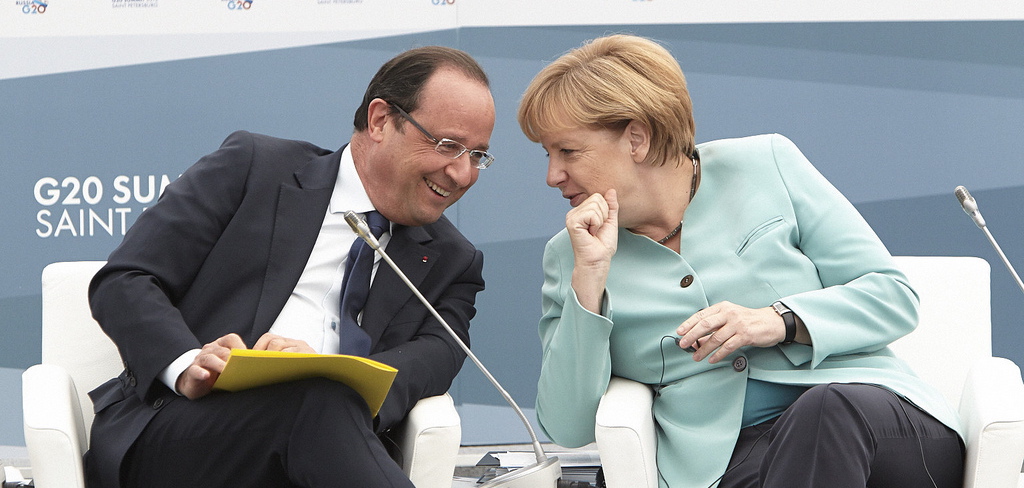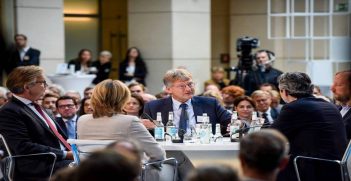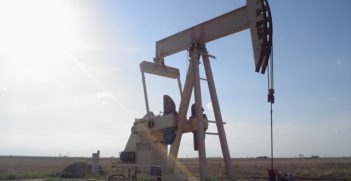Symbolic Embrace

The most touching moment of the recent commemoration of the D-day landings on the Normandy beaches was when the French President Francois Hollande welcomed Angela Merkel the German Chancellor: the hug and the mandatory Gallic kiss eliciting warm applause from the assembled dignitaries.
Few who were there could not have been touched by the sight of these representatives of states with such a long history of conflict embracing in a manner to indicate that the past had truly been buried. That this should have been happening in a year that commemorates the centenary of the outbreak of World War l, with all that that implies about the history of Franco-German relations, and against the background too of the emergence of increasing Euroscepticism, makes the event even more symbolic.
Stability Through Economic Integration
The European Coal and Steel Community (ECSC) of 1951 was the first major act of supranationalism after World War II and was designed to prevent war between France and Germany by blunting competition between them for essential industrial resources. The idea that economic integration encouraged peace as well as prosperity had its origins in the thinking of nineteenth century political economists like Bentham and Ricardo and was an essential rationale of successors to the ECSC like the European Economic Community (EEC) and the European Union (EU). But over the years it is not just France and Germany that have benefitted. Western Europe more generally was a place where war had been endemic before 1945 but since then it has been one of the most peaceful parts of the world. Clearly something has quenched the fires of war that once burned so fiercely among the European peoples, and that “something” according to liberal theorists, is economic integration. Realists thinkers like John Mearsheimer have argued instead that the Europeans practiced peace among themselves because of the need to remain united in the face of the Soviet threat, and absence that threat, nationalism would reassert itself and they would fall back into their old warring ways.
The Soviet threat vanished nearly twenty five years ago and still the EU holds together: the liberals appear to have had the better of the argument.
But they shouldn’t laugh too quickly. The strong showing of the Eurosceptics in the recent elections to the European Parliament is just the latest sign of dissatisfaction with the EU and what was unthinkable just a few years ago – the idea that the Union might fall apart – has bubbled to the surface of political conversation. There are elements of this critique that are peculiar to the current European condition in particular exceptionally high levels of unemployment in some countries, disgruntlement about the bureaucratisation and lack of legitimacy of EU processes and concern about the Union’s “open borders” policy and its alleged impact on immigration. But there are elements too of a more general or global nature: a growing preference for bilateral rather than multilateral arrangements, doubtless encouraged by the failed Doha Round process; a resurgence of nationalism; and an increasing awareness of growing inequality both within and between states and the perception that this is somehow a consequence of prevailing free-market economic orthodoxy. The issue of growing inequality is the subject of Thomas Piketty’s recent and highly-acclaimed book Capital in the Twenty First Century and is one that is not likely to go away soon.
But we are not likely to see any rapid unravelling of the EU. Indeed it still stands a good chance of remaining a permanent feature of world politics. Better governance of the Union and more acknowledgement of national differences have become more urgent priorities as a result of the current discontent and negotiating much needed reforms will not be easy. But the historic significance of what has been achieved is not likely to fade from the European consciousness. The benefits symbolised by that embrace on the Normandy beaches is not likely to be jettisoned any time soon, if ever.
Dr Bob Howard is a Councillor of AIIA NSW.





